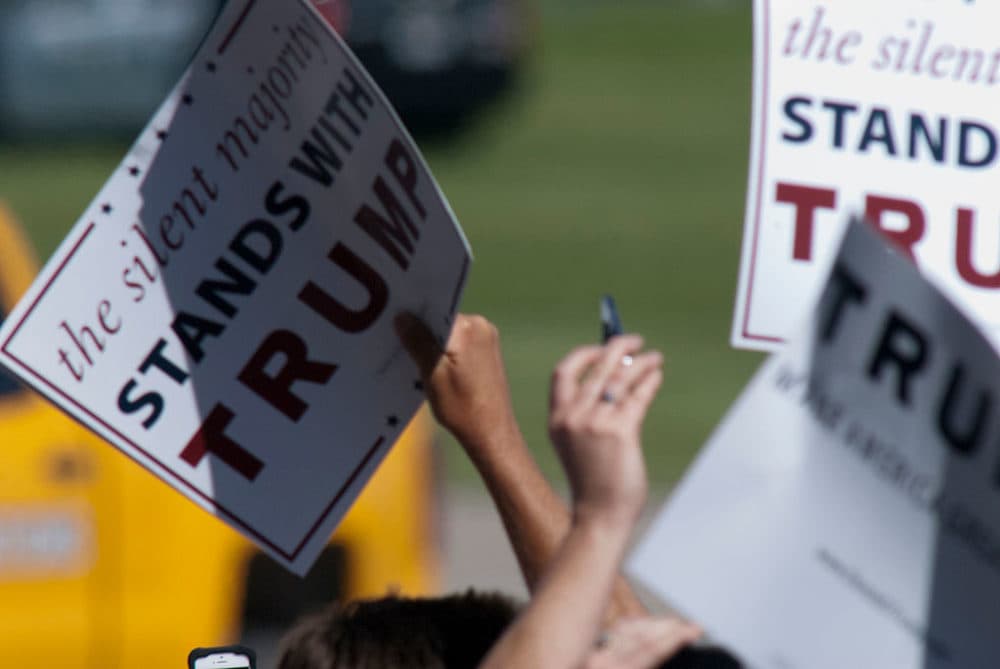Advertisement
Made Famous By Nixon, The Phrase 'Silent Majority' Resurfaces For Trump's 2020 Reelection

President Trump has responded to the protests over the killing of George Floyd with calls for law and order similar to former President Richard Nixon's pledge during his 1968 campaign.
Trump also tweeted about the "silent majority” — a phrase Nixon used to refer to when he asked for support.
The phrase has “a complicated history,” says Angie Maxwell, director of the Diane Blair Center of Southern Politics and Society and associate professor of political science at the University of Arkansas.
When Nixon used the phrase in 1968, his goal was to occupy a middle ground of voters between Democratic nominee Hubert Humphrey and third-party candidate George Wallace, the segregationist governor of Alabama.
The two major parties were realigning during Nixon’s presidency, Maxwell says. Republicans were split on civil rights and Democrats obtained an influx of Black voters, mostly in the South, after the institution of the Voting Rights Act.
But when Trump uses the phrase “silent majority,” it “rings hollow,” Maxwell says. That’s because Trump doesn’t occupy any middle ground politically.
“He's not Nixon. He's Wallace,” she says. “And his supporters are anything but silent.”
The political thinking during Nixon’s presidency was that there was a large group of Americans, specifically in the South, who supported the Vietnam War but stayed out of politics. He utilized the phrase “silent majority” in order to win their support for his Vietnam War plans.
Maxwell says these silent majority voters “liked their racism polite” — meaning they didn’t want to defend overtly racist policies as Wallace would presumably put forward. They also weren’t involved in civil rights movements and tended to consider Vietnam protesters as “hippie agitators,” as Wallace defined them, she says.
Thus, the silent majority became those who wanted to conserve the status quo, she explains.
Advertisement
But when comparing that moment to modern-day politics, glaring inconsistencies come to light. For one, Maxwell says, attitudes toward issues such as racism and police brutality are “dramatically shifting.”
The appeal of the silent majority can’t exist when it’s not actually silent or polite, she says, or when “a majority of Americans are showing warmer or approval attitudes of organizations like Black Lives Matter.”
And compared to Nixon’s “coded racism” and “benign neglect of civil rights enforcement,” Trump’s overt actions are harder to defend, she says.
She believes Trump is rehashing the phrase for two reasons.
“He likes the idea personally that the polling is wrong, that there's some kind of silent majority who supports him,” she explains. “And two, it's an attempt to stop the bleeding in terms of his support. His unfavorable numbers are so high now, and that makes those people who are on the fence feel less alone, that they're part of something bigger.”
As the 2016 presidential election showed the country, there were a significant amount of Trump voters, more than just a few fringe supporters. But Trump, in comparison to Nixon, isn’t trying to appeal to the middle — that’s been made clear through his far-right policies on a plethora of issues, she explains.
Maxwell says 2020 is shaping up to look a lot different than 2016, after Americans experienced four years of his administration and how he handled the coronavirus pandemic.
Plus, in 2016, the number of people who voted for third-party or write-in candidates played a significant role in the electoral votes, she adds.
Joe Biden, a white male candidate, also makes this year’s election different when compared to Hillary Clinton’s 2016 campaign for the Oval Office, she says.
“I hate these facts, but we can't change what we don't acknowledge,” she says. “When we measure for something called modern sexism as political scientists, which is not a belief that women cannot do the job, but it's a distrust of women who want to do the job — that measure had about a six-point effect. So it was as strong as racial resentment was in terms of predicting votes for [former President Barack] Obama.”
While a lot could happen between now and Election Day on Nov. 3, Maxwell says the combination of Trump’s falling approval rating and the number of people who have been politically energized since 2016 could create a political sea change.
The “big unknown,” she says, is how the coronavirus pandemic will play out over the next few months.
“But in terms of favorability for Biden versus Trump and the lack of a strong third party candidate or even any third-party candidate,” she says, “it's definitely an advantage [for] Biden right now.”
Alex Ashlock produced and edited this interview for broadcast with Tinku Ray. Serena McMahon adapted it for the web.
This segment aired on July 23, 2020.

